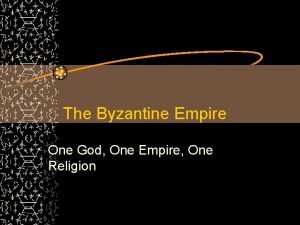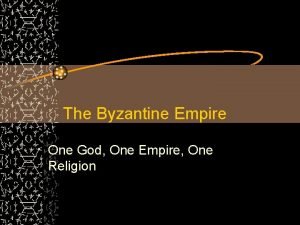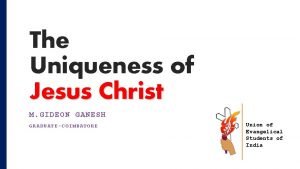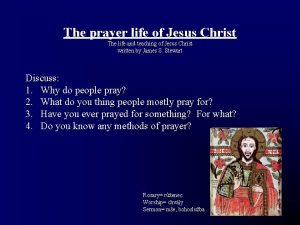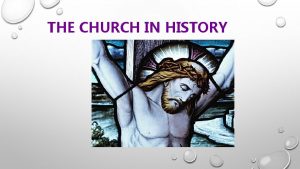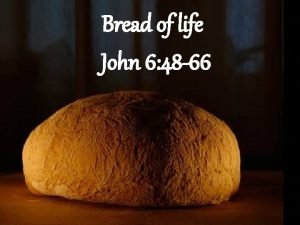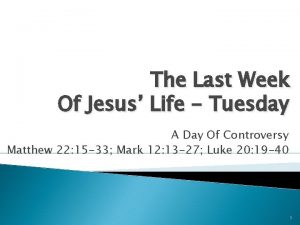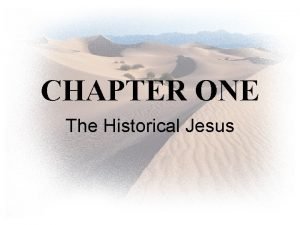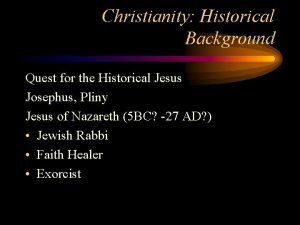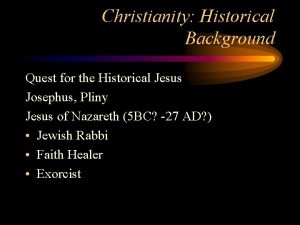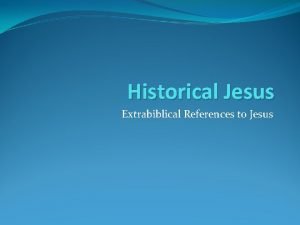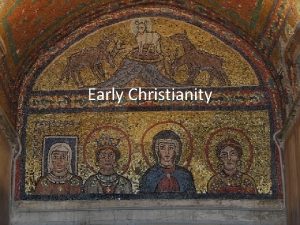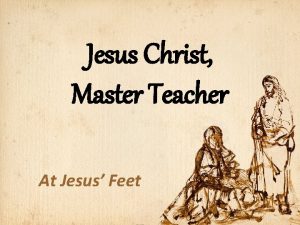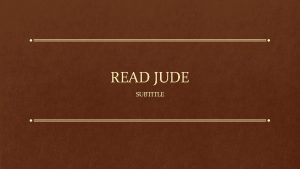Ch 3 Historical Life of Jesus Read One



































- Slides: 35

Ch 3: Historical Life of Jesus

§ Read: One Solitary Life p 60 § Some people claim we know virtually nothing about Jesus’ life because of the unreliability of historical records § Others claim he is a myth made up by misguided people § These are serious charges because Christianity and Catholicism rely on the historical existence of Jesus and the reliability of the Gospels

Ø Jesus was a remarkable teacher, yet he left no writings Ø He utilized oral instruction as his mode of teaching Ø We have no written records of his life from 6 BC to 30/33 AD Ø There are many reasons why credible historians don’t deny the existence of Jesus Ø 1. The Gospels and other New Testament writings Ø These documents date to the first century, only the Death and Resurrection of Jesus decades after

Ø Reasons Why Historians don’t deny Jesus’ existence Ø 1. Gospels and NT Writings Ø These writings tell us that Jesus was indeed a unique person who inspired them Ø They refer to other historical figures (Pontius Pilate and Herod the Great) and events (the destruction of the Jerusalem Temple) that other historical records verify

§ 2. Tacitus (56 -117 AD) § Cornelius Tacitus was a Roman senator and the greatest Roman historian § He wrote two main histories of Roman history § He spoke of the famous “Great Fire” in 64 AD under the reign of Nero § Nero blamed this fire on Christians and used it as an excuse to persecute them § Read inset p 62 § Tacitus likely checked official Roman records to compile history and spoke of Pilate (along with 2 Jewish writers as well)

Ø Tacitus described Christianity as a degrading and shameful superstition Ø He also did not deny the existence of Jesus Christ, the founder of this new religion Ø He also noted specifics of how early Christians were and tortured Ø Why did people endure such terrible mockery and punishments? persecuted

§ 3. Suetonius (70 -140 AD) § Gaius Suetonius Tranquillus was a Roman writer and biographer § He told of Jewish expulsion from Rome in 49 AD, claiming it was Jesus who instigated it What’s wrong with Suetonius’ story? § Jews and Christians most likely were fighting and Claudius kicked them all out § § This event is mentioned by St. Paul in Acts of the Apostles

Ø 4. Pliny the Younger (61 -113 AD) Ø Gaius Plinius Caecilius Sacundus was a senator, lawyer, and civilian administrator Ø He exchanged many letters with Emperor Trajan, many of which include references to Christ and Christians Ø He spoke of the rapid spread of the new religion and his uncertainty as to how Rome should deal with it Ø He was the first to write about Christian beliefs and a non-Christian worship from

§ 5. Josephus (37 -101 AD) § Flavius Josephus commanded Jewish forces during the First Jewish Revolt (66 -70 AD) § He was captured by the Romans, but predicted their future emperor and became a friend and citizen of Rome § He wrote volumes of Jewish history and speaks of the rule of Pontius Pilate and speaks of things Jesus did § Some of this work was probably changed, but Josephus did not question Christ’s existence

Ø 6. Thallus (c. 55 AD) Ø Thallus was a Greek historian Ø He spoke of the earthquake and darkness that followed Jesus’ death Ø He tried to explain this (eclipse of the sun) to refute the Christian belief that it was a miracle Ø Thallus knew about Jesus and his Death prior to when the Gospels were written

§ 7. Mara bar Serapion (73 AD) § Serapion was a philosopher who wrote a letter to his son § Read inset p 65 § Some scholars believe the “wise King” he refers to was Jesus § He felt there was a connection between his death and the destruction of the Jewish nation by the Romans § He spoke about the teachings of the ‘wise king’ living on through his followers

Ø 8. Lucian of Samosata (c. 115 -200 AD) Ø A Greek writer, Lucian mocked Christian faith and referred to some of their beliefs, including the Resurrection Ø He stated that Christians follow “that one”, their founder and lawgiver who was crucified Ø Handout: Non-Christian Testimonies

§ The excerpts from ancient Roman, Greek, and Jewish historians show us that references outside the Bible do not tell us much about him § They do, however, verify that he was an actual, historical person named Jesus and was executed under Pontius Pilate § These sources also verify that Jewish authorities had a hand in the death of Jesus § The New Testament gives us the strongest proof that Jesus existed

Ø Though the Gospels are not biographies in the modern sense, scholars recognize them in many biographical elements of the time Ø Why weren’t ancient biographies more detailed? Ø The length of scrolls required prevented long, detailed accounts of people’s lives Ø Ancient bios weren’t interested in the or youth either physical appearance Ø They tend to focus on certain events (especially how a person died)

§ Gospel means “Good News” § Their primary aim is to proclaim that God’s Kingdom is active in the world § They joyfully pronounce that God profoundly loves us, that Jesus died so our sins can be forgiven, and we could be saved and have eternal life § Read: St. Luke, the Evangelist p 67

§ Quiz Section 1 § Check info on Powerpoint on class page

Section 2: The Gospels

Ø The canon of official Sacred Scripture books of the Church contains 46 OT Books and 27 NT Books Ø The Church used three major criteria for including the Gospels of Matthew, Mark, Luke, and John in the official canon: Ø 1. Apostolic Origin: all four Gospels were written in the first century and are based on eye witness testimony Ø The evangelists had contact with the Apostles of Jesus and preserved their testimonies

The Church used three major criteria for including the Gospels of Matthew, Mark, Luke, and John in the official canon: Ø 1. Apostolic Origin Ø 2. Widespread Acceptance: these books were circulated and accepted Ø 3. Conformity to the rule of faith: writings needed to reflect the traditional faith of the Early Church Ø These writings could not deviate from that truth by teaching something that contradicted what Jesus said

Ø Many heretical writings were both excluded and condemned because they taught something contrary to the faith Ø Some books that did not make the canon of the Bible include the so-called apocryphal gospels Ø Apocryphal gospels: a group of writings about the life and teaching of Jesus that do not meet the Church criteria for inclusion in the New Testament

Ø Some books that did not make the canon of the Bible include the so-called apocryphal gospels Ø Apocryphal means “hidden” Ø Most apocryphal writings were excluded because they were written from the second to fourth centuries, many years after the apostolic era Ø The Church views these works as fiction and not worthy of belief

Ø Read: Why do we say that Jesus was born in a BC year? P 72 Ø What does AD stand for? Ø What does BC stand for? Ø Why is there no year 0?

§ § § The Church recognizes four faithful expressions of the Good News The four Gospels of Matthew, Mark, Luke, and John are the most important part of the NT because they are: 1. Authentic testimonies of faith in Jesus 2. Inspired writings 3. Written 4. Communal expressions of the Good News of Jesus

Ø Although these four Gospels are written for different audiences, they share the same Good News about Jesus Ø The perspective of each Gospel varied because different people were composing them at different times and at different places Ø Each provides insight to the author Ø Each was written to address the concerns of that community Ø The more you read the Gospels, the more you can recognize the similarities of the first 3

§ The more you read the Gospels, the more you can recognize the similarities of the first 3 § 80% of Mark’s verses appear in Matthew’s § Scholars call these 3 Gospels the Synoptic Gospels (Greek ‘syn opt’ meaning ‘to see together’) § However, less than 10% of the Synoptic Gospel material appears in John’s Gospel

Ø As a pious Jew, Jesus shared many of the beliefs and customs of his people Ø People argue that if Jesus merely repeated things that others said, it was nothing original or noteworthy Ø If, however, Jesus said things that his contemporaries could never dream of, then a strong case could be made that it came from him and him alone

“Abba” Reference § Abba is an Aramaic word, the language that Jesus spoke § It means “Daddy” or “Dad” but is usually translated as “Father” § Jews of the time used formal titles of great respect (Master of Heaven and Earth) § This emphasized that God was so great and divine that we are mere creatures compared to him, so they never would have used a familiar term like “daddy”

Ø Only God’s Son would feel comfortable using such an intimate term to address God Ø In Biblical times, no one else did Ø Jesus invites us to address God as Abba also because the Son, our brother, has revealed God the Father to us

Amen as an introduction § Amen is a Hebrew word that was borrowed by those who spoke Aramaic, including Jesus § The word means “certainly” § It was used at the end of an oath, blessing, curse to state that you agreed to something § Jesus used the word differently, to introduce, not end his statements

Ø “Amen, I say to you…” Ø The phrase was new and unusual the Gospel writers record Jesus saying it 75 times Ø No one but Jesus taught this way, he spoke with an unusual authority

Use of Parables Jesus used 41 unique stories in parable form to convey the message about the Kingdom of Heaven Consider the Good Samaritan (Luke 10: 25 -37) and the Prodigal Son (Luke 15: 11 -32) They are two of the most memorable and famous stories told by anyone in human history The teaching is revolutionary because it teaches us to love everyone– including our enemies!

Ø 3 Examples of Jesus’ Unique Teachings Ø 1: Jesus and Love Ø Jesus taught his followers to love their enemies and pray for their persecutors Ø This message of inclusion was not popular then, nor is it popular today Ø Jesus lived the message he taught; he asked God to forgive his executioners as he was dying on the cross

Examples of Jesus’ Unique Teachings 1. Jesus and Love 2. Jesus and Sacrifice Jesus constantly taught his disciples to sacrifice other people for him and “Whoever finds his life will lose it, and whoever loses his life for my sake will find it” Matthew 10: 39 Jesus ‘walked the walk’

Ø 3 Examples of Jesus’ Unique Teachings Ø 1: Jesus and Love; 2. Jesus and Sacrifice Ø 3. Jesus and Forgiveness of Sin Ø Over and over again in the Gospels, Jesus told people that their sines were forgiven Ø His opponents recognized what he was doing and charged him with blasphemy Ø Jesus was not a harmless teacher of proverbs; if he had been, Jewish authorities would not have opposed him

Quiz: Section 2 Homework: Crossword Puzzle Ch 2 Test on Ch 2 will be on: Make sure your note packets are complete!
 Jesus is the sweetest name i know
Jesus is the sweetest name i know Jesus in the morning
Jesus in the morning One empire one god one emperor
One empire one god one emperor One one one little puppy run
One one one little puppy run One king one law one faith
One king one law one faith Byzantine definition
Byzantine definition One ford
One ford See one do one teach one
See one do one teach one See one, do one, teach one
See one, do one, teach one One face one voice one habit and two persons
One face one voice one habit and two persons See one do one teach one
See one do one teach one One vision one identity one community
One vision one identity one community One vision one identity one community
One vision one identity one community One shot one life
One shot one life First they killed my father chapter summary
First they killed my father chapter summary Jesus you are lord
Jesus you are lord Ao invés de murmurares canta
Ao invés de murmurares canta Jesus jesus how i trust him
Jesus jesus how i trust him Historischer jesus verkündigter christus
Historischer jesus verkündigter christus Two paragraphs
Two paragraphs Jesus the superior one
Jesus the superior one Only one god jesus
Only one god jesus Wide awake drawing close stirred by grace
Wide awake drawing close stirred by grace One line jesus quotes
One line jesus quotes If you could ask jesus one question
If you could ask jesus one question Outline of jesus life
Outline of jesus life Prayer life of jesus christ
Prayer life of jesus christ Ce timeline
Ce timeline Senakulo setting
Senakulo setting Chronology of jesus life
Chronology of jesus life Jesus is our life saver
Jesus is our life saver Jesus answered
Jesus answered Key events in jesus life
Key events in jesus life Jesus bread of life
Jesus bread of life Tuesday last week
Tuesday last week Jesus you are the light of my life
Jesus you are the light of my life


